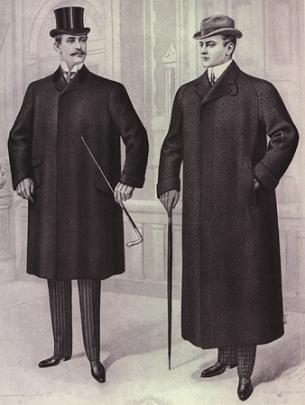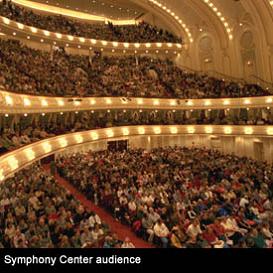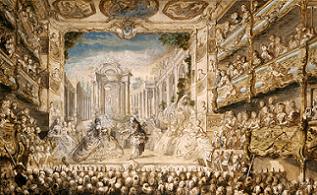Orchestra Etiquette, Or How To Stop Worrying & Love Bach
By Alexander Hough in Arts & Entertainment on Oct 13, 2010 7:20PM

Like these dandies, you do not have to wear a monocle to gain admittance to the orchestra. (Photo from Wikimedia Commons)
We thought the idea was a good one, so we decided to appraise the advice she received. The good news is that though the list is a bit discursive, it contains some good tips. Let's take a look:
Before the Show - A Little Prep Goes a Long Way
The best advice Brotman received can be followed before the show even starts: attending the CSO's pre-concert lectures, reading the program notes (available online before the concert), and listening to classical music (to which we'd add listening to the specific music you'll be seeing ahead of time). The more you know about the composer's biography, the art-historical context, and the greater historical context, and the better acclimated your ear is, the more you'll enjoy the concert. Think of it as going to the Art Institute and wearing the headphones and reading the placards.
The CSO isn't the only group to offer educational extras. Here are examples from this week alone: The Lyric Opera will hold lectures before the performances tonight (the premiere of "Carmen," by the way), Friday, and Saturday, and a symposium this Sunday; the Pacific Quartet will hold a free lecture/demonstration on Saturday and pre-concert talks on Sunday; and the CSO will hold the season's first "ClassicEncounter" before tomorrow night's performance.
For listening, check out WFMT 98.7 FM or visit your local library, which has more classical CDs than you'd expect. Or just watch or listen to stuff via YouTube. If you're having trouble finding what you want there, try searching in the language in which it was published in addition to English (e.g. "Le sacre du printemps" as well as "The Rite of Spring") or include the key (e.g. "Shostakovich Symphony No. 5 in D Minor").
Once You're There - Enjoy It, But Don't Sound Like You Enjoy It
Some of the article's advice we endorse, but we feel lousy about it. Specifically, this:
Don't applaud between movements. It is considered an interruption and distraction. One person began to clap mid-Eroica Symphony Thursday night and was summarily shushed.
Check out this one-minute clip for the part of Eroica Brotman was probably referring to. Seems like a great spot to clap, especially as it comes after almost 20 minutes of music, right?
Right. And you're wrong. This, the main part of orchestra etiquette, is far and away the touchiest, most fun-sucking part of classical music. Here's the gist: be as quiet as possible, and only clap following the conclusion of the piece, never in between movements. Classical pieces often - though not always - consist of related but unconnected smaller pieces. Even though there are breaks in between movements, they're considered part of a whole, uninterrupted experience, so applause is verboten (although loud coughing and murmuring is permissible).
Identifying what's the end of a movement and what is the end of the piece is easier said than done, however; even the use of program notes as a cheat sheet - the notes will list each separate movement and also frequently list the length in minutes of the piece - is an imperfect method because you can't always tell when there's a separation. So basically, don't clap until you hear other people clap.
Classical music events haven't always been austere, museum-like experiences, however. A must-read on the subject is Elizabeth Lunday's brief article on the history of audience behavior, which recounts the classical concert's evolution from a hobby for rude, distracted socialites to a hobby for uptight, condescending socialites. According to Lunday, the main change came in music's Romantic period during which the music itself became the event's focus, culminating in Gustav Mahler's iron-fisted rule of turn-of-the-20th-century concert halls.
To a large degree, though, the dedication to silence makes sense. Classical music is an acoustic art (save for certain exceptions in the past 60-odd years), and the heavily-nuanced, often subtle music is easily blanketed by ambient noise.
But the clapping? The New Yorker's classical music critic Alex Ross - the best in the game, if you're looking for further reading - gave a lecture-cum-article in which he summarized the dilemma: Yes, clapping after a solemn movement ruins the moment, but nothing is gained by not clapping at the end of an exciting movement. Strict adherence to any rule, whether it's to clap or not to clap, ruins the fun. We're with Ross when he says, "I'm with [acclaimed pianist Emanuel] Ax when he says, "I think that if there were no 'rules' about when to applaud, we in the audience would have the right response almost always.'" Seriously, people, it's just music.
Alas, this is the convention, and while we secretly wish for a mass movement to shake things up so we could have a little more fun in the concert hall, protest at your own risk. Fellow patrons will shush you as soon as look at you.
Best Piece of Advice We Wouldn't Have Come Up With
Look as well as listen. "Watch the way the music moves from place to place," Nelis said. "It moves from the strings to the brass to the horns to the woodwinds. … It's just really cool to watch it."Maybe it's not as entertaining as a Spinal Tap show, but it's still interesting to watch what's going on.
Er...Questionable Advice
There's a stigma attached to (classical music), that's it's snobby," said Jim Nolen, of Elmhurst, a 48-year CSO veteran I met at the preconcert lecture. "The opposite is true...The musicians are so friendly when you meet them. They're ordinary, working-class people. We had a bassoon player who collected fossils."Exactly: A bassoon player who collected fossils. Look, classical musicians have been spending several hours a day alone in a practice room since they were young. From an early age they were outcasts, at best because they were more talented than their peers, at worst because kids like to pick on musicians. Perfection is mandatory. There are far too few jobs available given the talent pool, but the demand for classical music is low. They wear tuxedos to work, yet they're in a union. We're not saying normal classical musicians don't exist. We're just saying there are a lot of weirdos.
Sit in the gallery.Good. They're the most affordable seats, and you won't risk having your view blocked by a pillar as you would in the next tier down (Orchestra Hall, like Wrigley, has some terrible seats).
Not only are these the least expensive seats,See? We told you so.
but gallery regulars swear they have the best acoustics in the house. The sound travels up along the curve of the ceiling and "comes right at us," said Arnie Samuel, of Palos Hills.Whoa boy. Unfortunately, a sound wave moves through air in a single direction until it's absorbed or reflected, it doesn't crawl like a spider. Fortunately, the gallery seats still sound pretty good.

Photo courtesy of the Chicago Symphony Orchestra
It is extremely hard for anyone without significant exposure to classical music to truly understand it, [Charles Pikler, the CSO's principal violist] said.Pikler! We're trying to get people to go see classical music here! Yes, knowledge and experience helps with the enjoyment, and that's probably what Pikler meant, but "understanding music" is exactly the sort of elitist drivel that keeps people away.
It's that sort of conception of classical music - Brotman said she had reservations because "the world of the CSO seemed intimidating; the music, daunting" - that has led to classical music's popularity issues. It's an esoteric, überintellectual pastime, qualities its adherents prize, which in turn leads to it being pretentious, a quality its adherents also prize. It's a vicious circle that has combined with a lack of music education to put classical music in dire straits.
All of which is why our main piece of advice is this:
Don't worry about the rules, don't worry about the stereotypes.
Yes, the crowd dresses well, and the orchestra members dress like English butlers for some reason, but you won't get kicked out if you wear jeans. Yes, you might get old-person spittle on you if you clap at the wrong time, but it doesn't stain. Yes, pieces tend to be longer and more technically complicated than other genres, but it's just music.
Above all, go with an open mind, seek out additional information, and don't be afraid to ask questions.
